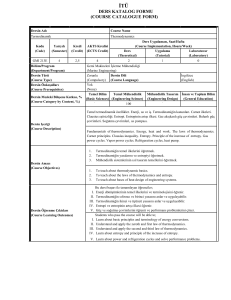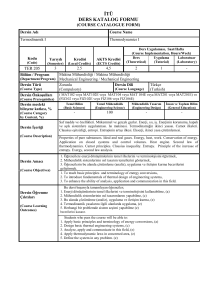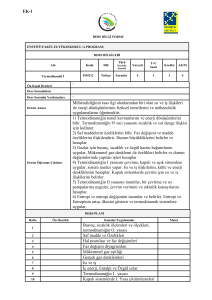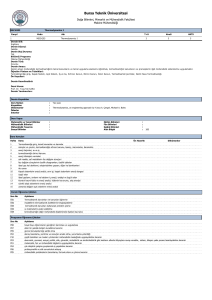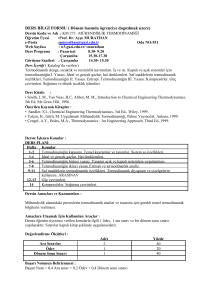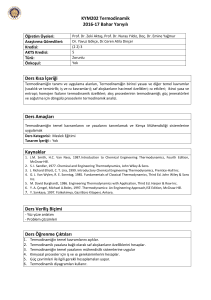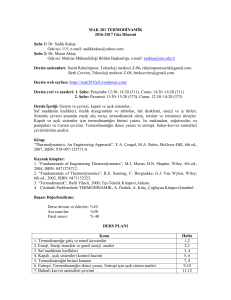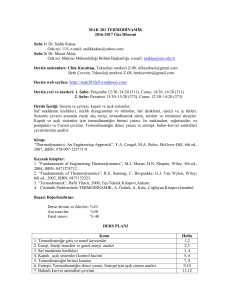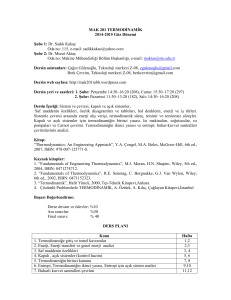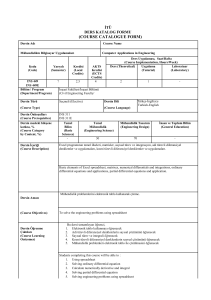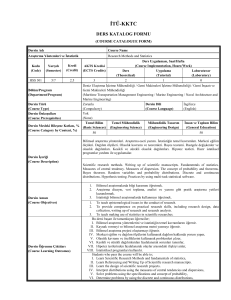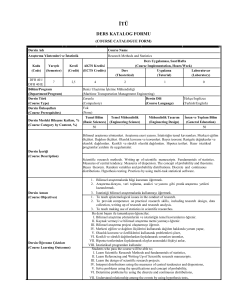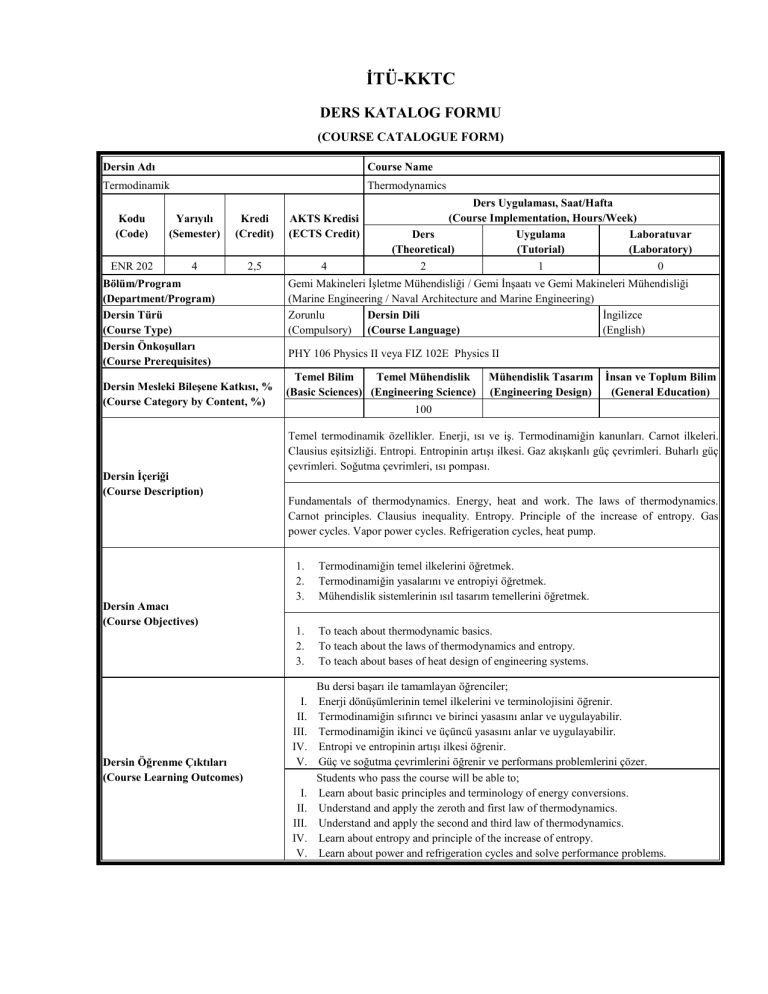
İTÜ-KKTC
DERS KATALOG FORMU
(COURSE CATALOGUE FORM)
Dersin Adı
Course Name
Termodinamik
Thermodynamics
Kodu
(Code)
Yarıyılı
(Semester)
Kredi
(Credit)
AKTS Kredisi
(ECTS Credit)
ENR 202
4
2,5
4
Bölüm/Program
(Department/Program)
Dersin Türü
(Course Type)
Dersin Önkoşulları
(Course Prerequisites)
Dersin Mesleki Bileşene Katkısı, %
(Course Category by Content, %)
Dersin İçeriği
(Course Description)
Dersin Amacı
(Course Objectives)
Dersin Öğrenme Çıktıları
(Course Learning Outcomes)
Ders Uygulaması, Saat/Hafta
(Course Implementation, Hours/Week)
Ders
Uygulama
Laboratuvar
(Theoretical)
(Tutorial)
(Laboratory)
2
1
0
Gemi Makineleri İşletme Mühendisliği / Gemi İnşaatı ve Gemi Makineleri Mühendisliği
(Marine Engineering / Naval Architecture and Marine Engineering)
Zorunlu
İngilizce
Dersin Dili
(Compulsory) (Course Language)
(English)
PHY 106 Physics II veya FIZ 102E Physics II
Temel Bilim
Temel Mühendislik
(Basic Sciences) (Engineering Science)
Mühendislik Tasarım
(Engineering Design)
İnsan ve Toplum Bilim
(General Education)
100
Temel termodinamik özellikler. Enerji, ısı ve iş. Termodinamiğin kanunları. Carnot ilkeleri.
Clausius eşitsizliği. Entropi. Entropinin artışı ilkesi. Gaz akışkanlı güç çevrimleri. Buharlı güç
çevrimleri. Soğutma çevrimleri, ısı pompası.
Fundamentals of thermodynamics. Energy, heat and work. The laws of thermodynamics.
Carnot principles. Clausius inequality. Entropy. Principle of the increase of entropy. Gas
power cycles. Vapor power cycles. Refrigeration cycles, heat pump.
1.
2.
3.
Termodinamiğin temel ilkelerini öğretmek.
Termodinamiğin yasalarını ve entropiyi öğretmek.
Mühendislik sistemlerinin ısıl tasarım temellerini öğretmek.
1.
2.
3.
To teach about thermodynamic basics.
To teach about the laws of thermodynamics and entropy.
To teach about bases of heat design of engineering systems.
I.
II.
III.
IV.
V.
I.
II.
III.
IV.
V.
Bu dersi başarı ile tamamlayan öğrenciler;
Enerji dönüşümlerinin temel ilkelerini ve terminolojisini öğrenir.
Termodinamiğin sıfırıncı ve birinci yasasını anlar ve uygulayabilir.
Termodinamiğin ikinci ve üçüncü yasasını anlar ve uygulayabilir.
Entropi ve entropinin artışı ilkesi öğrenir.
Güç ve soğutma çevrimlerini öğrenir ve performans problemlerini çözer.
Students who pass the course will be able to;
Learn about basic principles and terminology of energy conversions.
Understand and apply the zeroth and first law of thermodynamics.
Understand and apply the second and third law of thermodynamics.
Learn about entropy and principle of the increase of entropy.
Learn about power and refrigeration cycles and solve performance problems.
Ders Kitabı
(Textbook)
Diğer Kaynaklar
(Other References)
Yunus Çengel – M. Boles, Thermodynamics an Engineering Approach, Mc Graw Hill,
2003.
R. Sonntag - G. Van Wylen, Thermodynamics, John Wiley, New York 2003.
2 ödev
Ödev ve Projeler
(Homework and Projects)
2 homeworks
Evet
Laboratuvar Uygulamaları
(Laboratory Work)
Yes
Bilgisayar Kullanımı
(Computer Use)
Diğer Uygulamalar
(Other Activities)
Başarı Değerlendirme Sistemi
(Assessment Criteria)
Faaliyetler
(Activities)
Yıl İçi Sınavları
(Midterm Exams)
Kısa Sınavlar
(Quizzes)
Ödevler
(Homework)
Projeler
(Projects)
Dönem Ödevi/Projesi
(Term Paper/Project)
Laboratuvar Uygulaması
(Laboratory Work)
Diğer Uygulamalar
(Other Activities)
Final Sınavı
(Final Exam)
Adedi
(Quantity)
Değerlendirmedeki Katkısı, %
(Effects on Grading, %)
1
30
2
20
1
50
DERS PLANI
Hafta
Konular
Ders
Çıktıları
1
Termodinamiğe giriş ve temel kavramlar
I
2
Enerji, iş ve ısı
I
3
Enerji, iş ve ısı
I
4
Termodinamiğin sıfırıncı ve birinci yasası
II
5
Termodinamiğin birinci yasası
II
6
Termodinamiğin ikinci yasası
III
7
Termodinamiğin ikinci ve üçüncü yasası
III
8
Entropi ve entropinin artışı
IV
9
Entropi ve entropinin artışı
IV
10
Güç çevrimleri
V
11
Güç çevrimleri
V
12
Güç çevrimleri
V
13
Soğutma çevrimleri
V
14
Performans problemleri
V
COURSE PLAN
Weeks
Topics
Course
Outcomes
1
Introduction to thermodynamics and basic definitions
I
2
Energy, work and heat
I
3
Energy, work and heat
I
4
The zeroth and first law of thermodynamics
II
5
The first law of thermodynamics
II
6
The second law of thermodynamics
III
7
The second and third law of thermodynamics
III
8
Entropy and principle of the increase of entropy
IV
9
Entropy and principle of the increase of entropy
IV
10
Power cycles
V
11
Power cycles
V
12
Power cycles
V
13
Refrigeration cycles
V
14
Performance problems
V
Dersin Gemi Makineleri İşletme Mühendisliği Programıyla İlişkisi
Katkı
Seviyesi
Programın Mezuna Kazandıracağı Bilgi ve Beceriler (Programa İlişkin Çıktılar)
1
2
a
Matematik, fen ve mühendislik bilgilerini uygulama becerisi
b
Deney tasarlama, deney yapma, veri toplama, sonuçları analiz etme ve yorumlama becerisi
c
Gereksinime yönelik bir sistemi, parçayı veya süreci ekonomik, çevresel, sosyal, politik, etik, sağlık ve
emniyet, üretilebilirlik ve sürdürülebilirlik gibi gerçekçi kısıtlamalar altında tasarlayabilme becerisi
d
Çok disiplinli takım çalışması yürütebilme becerisi
e
Mühendislik problemlerini belirleme, formüle etme ve çözme becerisi
f
Mesleki ve etik sorumluluklara sahip olma bilinci
g
Etkin iletişim kurabilme becerisi
h
Mühendislik çözümlerinin etkilerini küresel, ekonomik, çevresel ve toplumsal çerçevede anlama becerisi
x
i
Yaşam boyu öğrenme gereksinimini kavrama ve bunu uygulama yeteneği
x
j
Güncel/çağdaş konulara ilişkin bilgi sahibi olma
x
k
Mühendislik için gerekli teknikleri ve modern cihazları kullanabilme becerisi
l
Her tip gemi ana ve yardımcı makinesini çalıştırma, bakımlarını gerçekleştirme, arızalarını saptayıp giderme
ve gemi güvenliğini sağlayabilme becerisi
1: Az,
2: Kısmi,
3
x
x
x
x
3: Tam
Relationship Between the Course Marine Engineering Curriculum
Level of
Contribution
Program Outcomes
1
2
a
An ability to apply knowledge of mathematics, science, and engineering
b
An ability to design and conduct experiments, as well as to analyze and interpret data
c
An ability to design a system, component, or process to meet desired needs within realistic constraints such
as economic, environmental, social, political, ethical, health and safety, manufacturability, and sustainability
d
An ability to function on multidisciplinary teams
e
An ability to identify, formulate, and solve engineering problems
f
An understanding of professional and ethical responsibility
g
An ability to communicate effectively
h
The broad education necessary to understand the impact of engineering solutions in a global, economic,
environmental, and societal context
x
i
A recognition of the need for, and an ability to engage in life-long learning
x
j
A knowledge of contemporary issues
x
k
An ability to use the techniques, skills, and modern engineering tools necessary for engineering practice
l
An ability to operate and maintain any marine main and auxiliary machinery, as well as to ensure ship safety
through diagnosing and remedying engine troubles
1: Little,
2: Partial,
Düzenleyen (Prepared by)
x
x
x
x
3: Full
Tarih (Date)
3
İmza (Signature)

